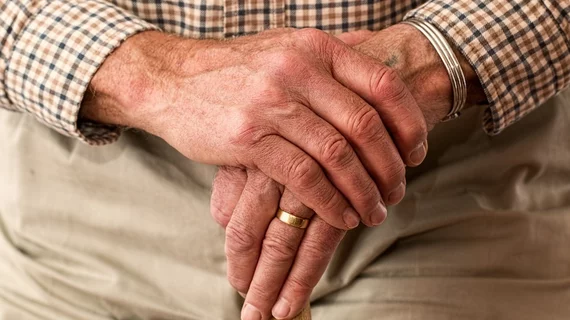How heart patients fare after they’ve been rejected for TMVR
Patients deemed ineligible for transcatheter mitral valve repair (TMVR) who don’t undergo subsequent MV repair have poor clinical outcomes compared to those who are cleared for the procedure, according to a study published in the January edition of JACC: Cardiovascular Interventions.
In spite of the increasing availability of TMVR—a less-invasive alternative to open heart surgery—a good portion of elderly patients and those with severe mitral regurgitation (MR) aren’t eligible for the procedure due to either anatomic or clinical reasons, wrote Hiroki Niikura, MD, and colleagues at the Minneapolis Heart Institute Foundation.
“Insight into the characteristics and clinical outcomes of patients not eligible for TMVR is needed as the field develops, with the goal of improving opportunities for treatment and ultimately the prognosis of patients with MR who are in need of surgical correction,” the authors wrote. “To the best of our knowledge, no investigation thus far has addressed this population of patients with MR.”
Niikura et al. recruited 203 patients in their 70s and 80s who were ineligible for participation in early feasibility studies of TMVR. The ineligibility rate in the group was 89 percent—a high number attributed mostly to frailty (15.3 percent of cases), severe tricuspid regurgitation (15.3 percent of cases) and prior aortic valve therapy (14.2 percent of cases). The authors reported mitral anatomic exclusions were present in 15.8 percent of patients, with severe annular calcification in 7.4 percent.
A minority of patients, 37.4 percent, didn’t undergo subsequent commercial surgical or transcatheter mitral valve therapy, which led to an 11.8 percent cardiac death rate and a 22.4 percent heart failure hospitalization rate at one year. Those who did undergo procedures saw much lower rates of cardiac death and HF hospitalization—2.4 percent and 5.5 percent, respectively.
Niikura’s team acknowledged some barriers, like excessive frailty, might be difficult to manage clinically with TMVR, but said their findings suggest a number of causes of current ineligibility could be addressable.
“The feasibility of TMVR with multiple different prostheses already has been described for both of these pathological subsets, and national clinical trials examining TMVR in these patients are underway,” they wrote. “For patients with severe tricuspid regurgitation, transcatheter therapy is a rapidly developing field and also is the subject of several ongoing clinical investigations in patients at high or prohibitive surgical risk.”
The authors said patients receiving the interventional treatment also had a lower prevalence of secondary MR compared to those who didn’t undergo treatment (24.6 percent versus 50 percent), though those patients also had a higher prevalence of severe symptoms.
“Although no procedural mortality was observed with transcatheter repair, the outcomes with open surgery (7 percent in-hospital mortality) reflected the high-risk nature of the study population,” the team wrote. “Taken together, these findings suggest that addressing the causes for TMVR ineligibility will be required to improve the outcomes of patients with MR regardless of whether they do or do not undergo TMVR.”

